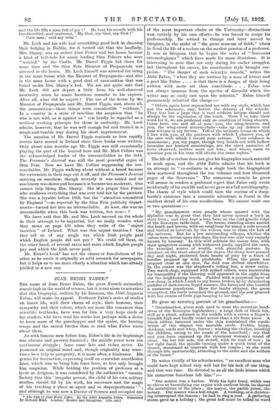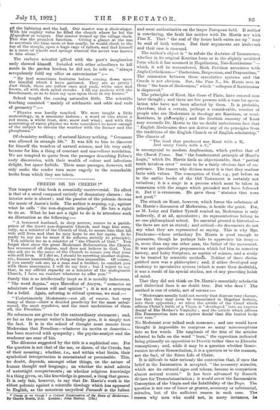JEAN HENRI PADRE.* THE name of Jean Henri Fabre, the
great French naturalist, stands high in the world of science, but it is not alone to scientists that this biography, written by his kinsman, the Abbe Augustin Fabre, will make its appeal. Professor Fabre's series of studies on insect life, with their charm of style, their humour, their sympathy and their colour, which are more like romances than scientific textbooks, have won for him a very large circle of lay readers, who have read his works less perhaps with a desire to learn more of the grasshopper and the spider, the hunting wasps and the sacred beetles than to read what Fabre wrote about them.
As with famous men before him, Fabre's life in its beginnings was obscure and poverty-haunted ; the middle years were one continuous struggle ; fame came late and riches never. He possessed an original mind and, though originality may some- times be a help to prosperity, it is more often a hindrance. His genius for instruction, expressing itself on somewhat unorthodox lines, which was to bring him fame later, at first only brought him suspicion. While holding the position of professor at a lye& at Avignon, it was considered by the authorities " unsatis- factory that this ' irregular person, the child of his own solitary studies, should fill by his work, his successes and the magic of his teaching a place so apart and so disproportionate ' " ; and although he was now a Doctor of Science and occupied one • The Lie of Jean Henri Fare. By the Abbe Atiguattu Fabre. Translated by Bernard Mall London : Hodder and Stoughton. 115s. net.] of the most important chairs at the Univeraity—distinctions won entirely by his own efforts—he was forced to resign his professorship. He retired to Orange and later moved to Serignan, in the midst of " the great museum of fields," where he lived the life of a recluse on the modest pension of a professor.
It was at Serignan that he began the series of " Souvenirs entomologiques " which have made his name illustrious. It is interesting to note that not only during his earlier struggles, but throughout his career, his unorthodox style brought sus- picion. " The danger of such scientific records," writes the Abbe Fabre, " when they are written by a man of letters and a poet like Fabre . . . is that there is a danger of their being written with more art than exactitude.. . Fabre was not always immune from the species of discredit which the writer may so easily cast upon the scientist." Fabre himself passionately rebutted the charge :— " Others again have reproached me with my style, which has not the solemnity, nay, better, the dryness of the schools. They fear lest a page that is read without fatigue should net always be the expression of the truth. Were I to take their word for it, we are profound only on condition of being obscure. Come here, one and all of you—you, the sting-bearers, and you, the wing-cased armour-clads—take up my defence and bear witness in my favour. Tell of the intimate terms on which I live with you, of the patience with which I observe you, of the care with which I record your actions. Your evidence is unanimous ; yes, my pages, though they bristle not with hollow formulae nor learned smatterings, are the exact narrative of facts observed, neither more nor less ; and whose cares to question you in his turn will obtain the same replies."
The life of a recluse does not give his biographer much material to work upon, and the Abbe Fabre admits that his book is an attempt to " co-ordinate in a single book the biographical data scattered throughout the ten volumes and four thousand pages of the Souvenirs." The numerous extracts he gives will arouse in readers a profound regret that Fabre only wrote incidentally of his own life and never gave us a full autobiography. The charm of style which could turn the routine of a dung- beetle's existence into a romantic adventure is found in the smallest detail of his own recollections. We cannot resist one or two quotations :- " My grandparents were people whose quarrel with the alphabet was so great that they had never opened a book in their lives ; and they kept a lean farm on the cold granite ridge of the Rouergue table-land. The house, standing alone amidst the heath and broom, with no neighbour for many a mile- around and visited at-intervals by the wolves, was to them the hub of the universe. But for a few surrounding villages, whither the calves were driven upon fair-days, the rest was only very vaguely known by hearsay. hi this wild solitude the mossy fens, with their quagmires oozing with iridescent pools, supplied the cows, the principal source of wealth, with plentiful pasture. In summer, on the short sward of the slopes, the sheep were penned day and night, protected from beasts of prey by a fence of hurdles propped up with pitchforks. When the grass was cropped close at one spot, the fold was shifted elsewhither. In the centre was the shepherd's rolling hut, a straw cabin. Two watch-dogs, equipped with spiked collars, were answerable for tranquillity if the thieving wolf appeared in the night from out the neighbouring woods. Padded with a perpetual layer of cow-dung, in which I sank to my knees, broken up by shimmering puddles of dark-brown liquid manure, the farmyard also boasted a numerous population. Here the lambs skipped, the geese trumpeted, the fowls scratched the ground, and the sow grunted with her swarm of little pigs hanging to her dugs."
He gives an arresting portrait of his grandmother :- " Grandmother, pious soul, used to wear the eccentric head- dress of the Rouergue highlanders ; a large disk of black felt, stiff as a plank, adorned in the middle with a crown a finger's- breadth high and hardly wider across than a six-franc piece. A black ribbon fastened under the chin maintained the equili- brium of this elegant but unstable circle. Pickles, hemp, chickens, curds and whey, butter ; washing the clothes, minding the children, seeing to the meals of the household ; say that and you have summed up the strenuous woman's round of ideas. On her left side, tha distaff, with its load of tow ; in her right hand, the spindle turning under a quick twist of the thumb, moistened at intervals with her tongue ; so she went through life, unweariedly, attending to the order and the welfare of the house."
He writes vividly of his schoolmaster, " an excellent man who could have kept school very well but for his lack of one thing, and that was time. He devoted to ua all the little leisure which his numerous functions left him " :- " Our master was a barber. With his light hand, which was so clever at beautifying our copies with curlicue birds, he shaved the notabilities of the place ; the mayor, the parish priest, the notary. Our master was a bell-ringer. A wedding, or a christen- . ing interrupted the lessons ; he had to ring a peal. A gathering storm gave us a holiday ; the great bell must be tolled to ward pff the lightning and the hail. Our master was a choir-singer. With his mighty voice he filled the church where he led the Afaynificat at vespers. Our master wound up the village clock. This was the proudest function. Giving a glance at the sun to ascertain the time more or less nearly, he would climb to the top of the steeple, open a huge cage of rafters, and find himself in a maze of wheels and springs whereof the secret was known to him alone."
The embryo scientist gifted with the poet's imagination early showed himself. Detailed with other schoolboys to kill snails in the garden borders, he did not, he tells us, " always scrupulously fulfil my office as exterminator " My heel sometimes hesitates before coming down upon the handful which I have gathered. They are so pretty ! Just think, there are yellow ones and pink, white ones and brown, all with dark spiral streaks. I fill my pockets with the handsomest, so as to feast my eyes upon them at my leisure."
School taught the coming naturalist little. The scientific teaching consisted " mainly of arithmetic and odds and ends of geometry " :—
" Physics was hardly touched. We were taught a little meteorology, in a summary fashion ; a word or two about a red moon, a white frost, dew, snow and wind ; and with this smattering of rustic physics we were considered to know enough of the subject to discuss the weather with the farmer and the ploughman."
Of chemistry nothing ; of natural history nothing. " Grammar was allowed to strangle life." It was left to him to discover for himself the wonders of natural science, and life very early became for him a thing of constant and marvellous revelation. We are tempted to quote from the passages describing Fabre's early discoveries, with their wealth of colour and infectious delight, but space forbids. These same passages, however, will only make the reader turn more eagerly to the remarkable books from which they are taken.



































 Previous page
Previous page